Substitutes for Oat Flour: 4 Best Alternatives + FAQs!
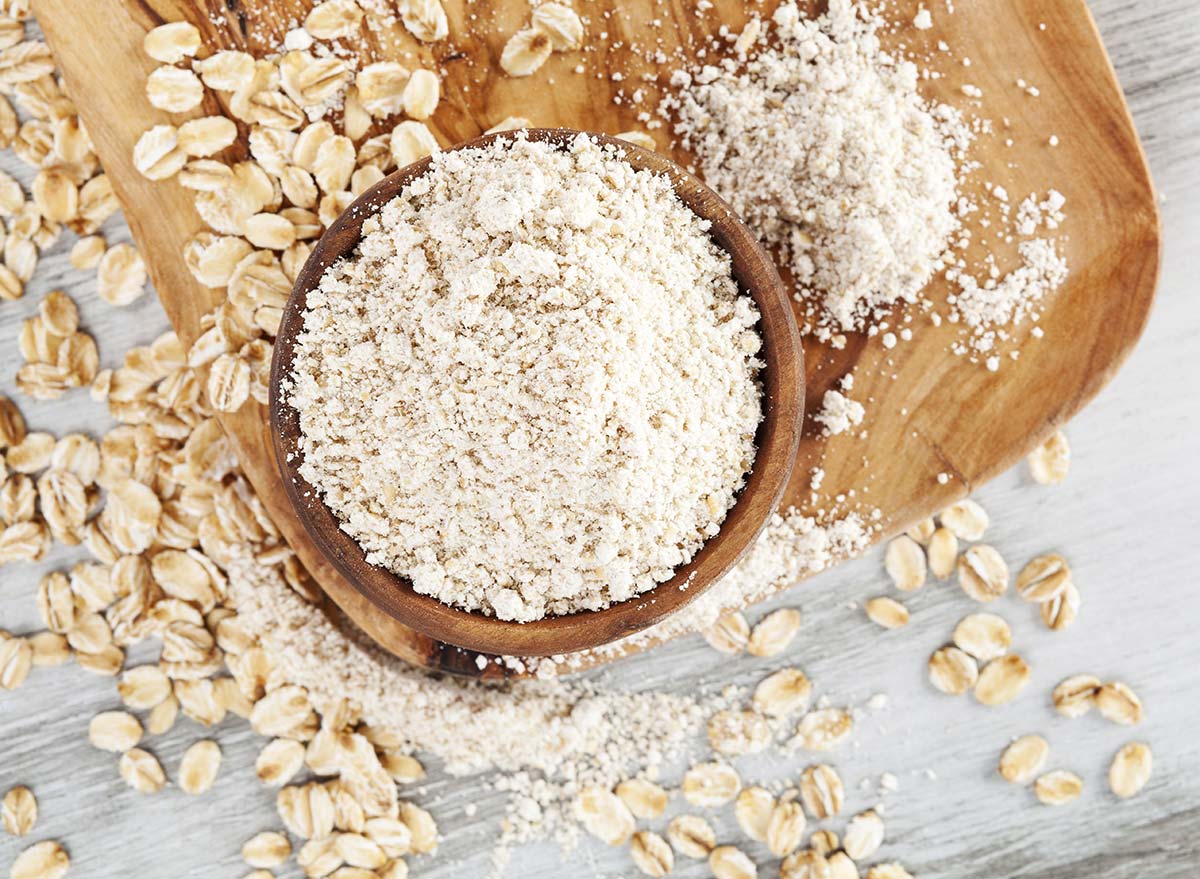
Oat Flour is one of the best forms of carbohydrates for completing a well-balanced diet by far. It is, in fact, widely accessible in most supermarkets and marketplaces. Choosing oat flour will never let you down if you avoid bad carbohydrates and get extra fiber from your diet.
If you don’t like oatmeal or just ran out, there are alternative options to consider, such as brown rice flour. You may also use coconut flour, almond flour, or standard oatmeal as oat flour alternatives. Let’s look at how these four alternatives operate in most recipes.
1. Rice Flour (Brown)
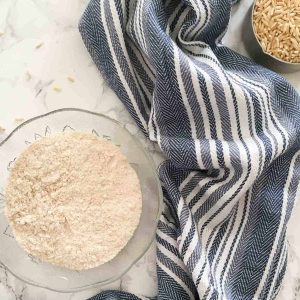
Brown rice flour is made by milling and grinding brown rice until it reaches a powdery consistency. When compared to white rice, brown rice is prepared differently. It’s important not to mix it with white rice because they’re not the same.
During refining, the husks were removed from white rice, which explains its white look. Brown rice, on the other hand, has not been refined and keeps the majority of its natural components. Brown rice, on the other hand, maintains more minerals and other micronutrients, particularly fiber, due to its lack of refining. It’s no surprise that it’s one of the most popular alternatives to white carbs among health-conscious people.
You may use brown rice flour when you run out of oat flour. Because of its versatility in many meals, it is the perfect alternative. Rice flour is mainly used in sweets, particularly sticky rice cake dishes, although you can also use it in other baking recipes. Replace a cup of oat flour with 3/4 cup of brown rice flour when replacing.
2. Coconut Flour
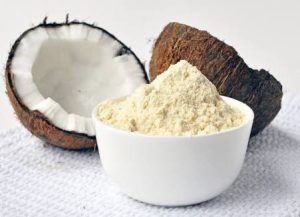
If you’re seeking a gluten-free alternative, coconut flour may be just what you’re looking for. Coconut flour, like oat flour, is gluten-free, making it suitable for individuals who have a gluten sensitivity or who are avoiding gluten for health reasons. This flour is high in fiber, protein, and MCTs, which help keep blood sugar levels in check.
It also helps with digestion and even detects potential cardiac concerns early on. Furthermore, it has a low-calorie count. Because it’s a healthy form of carb that you can rely on, you won’t have to worry about tracking your consumption as much. The scent of coconut flour is one of its most appealing features. It’s one of my favorite things to use with baked goods since it eliminates the need for vanilla extract.
However, it would be best to be warned that coconut flour is quite absorbent. However, be sure to modify the amount of liquid in your meal to avoid it becoming dry or crumbly. The change is simple: 1 cup coconut flour to 1 cup oat flour, 1 cup coconut flour to 1 cup oat flour.
3. Almond Flour
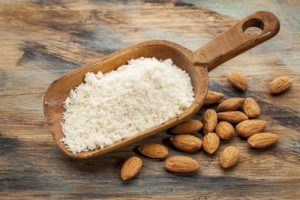
Fresh ground almonds are used to make this nut-based flour. If you didn’t already know, almonds are a superfood that is not only delicious as a snack but also helps your body maintain a healthy lifestyle. If you can’t eat meat, almonds and other nuts can provide enough protein to prevent vitamin insufficiency.
Almond flour has swept the health world by presenting many dishes made with it. It’s not only good for you, but it’s also cost-effective. It’s less expensive than other oat flour alternatives, and you can make it yourself. If you have a food processor, crush the peeled almonds until a powder consistency is achieved.
It’s extremely simple to use; use a cup of almond flour instead of oat flour. It may be stored in an airtight container and used in any meal you can think of. Because of its flexibility, you’ll never run out of foods to test it with, including nutritious cookies, bakes, pies, and other recipes.
4. Oatmeal
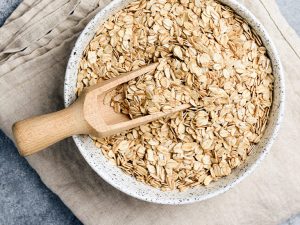
There’s no need to hunt for alternative substitutes if you appreciate the flavor and scent of oat flour. I’m sure you have a stockpile of the all-time favorite morning staple, oats, in your pantry. Yes, you may use oatmeal instead of oat flour in this recipe. Oatmeal is processed similarly to almond flour is processed into a powder.
Start with a cup of oats and grind it in the food processor from there. Voila! You’ve obtained quick oat flour. You can also personalize your flour by letting it mill in the food processor for a few minutes if you want it to have more texture. Leave it to process until it’s as fine as sand if you want it as fine as possible.
FAQs
Would I be able to utilize white flour to substitute oat flour?
Without a doubt, yes. If you don’t have a choice and all you have is plain old white flour, go ahead and use it. It’s preferable to waste time on a trip to the store. Remember that white flour floats higher than oat flour. Your cooked food will likely be fluffy and softer due to the baking process.
What’s the contrast between oat flour and cereal?
To be honest, not much. Its physical traits are the sole thing that sets it apart. The original form of oat flour is oatmeal. It becomes oat flour when processed into a powdery consistency. As a result, you may utilize any of them to make substitutes.
Would I be able to utilize generally good flour to substitute oat flour?
Yes absolutely. However, think about the kind of foods you’re cooking and the consistency you’re aiming for. Remember that substitutions have consequences; using oat flour instead of all-purpose flour may not yield the same results.
What are some of the most excellent oat flour recipes?
When preparing bread, oat flour is typically used. Oat flour is excellent for making thicker, indulgent bread. Regular sliced bread, dinner rolls, baguettes, and other bread recipes are some of my favorites. Some individuals, including me, prefer substantial bread over light and fluffy bread.
Is oat flour better compared to wheat flour?
Oat flour is superior to wheat flour in specific nutritional content in specific ways. Wheat flour, unlike oat flour, contains gluten. They both provide a decent quantity of fiber and other vitamins and minerals as an overall healthy carb. Oat flour is not an acceptable alternative for wheat flour if you have a gluten intolerance. If you’re attempting to eliminate gluten in your diet, I still recommend sticking to oat flour and other gluten-free flours.
Key Takeaway
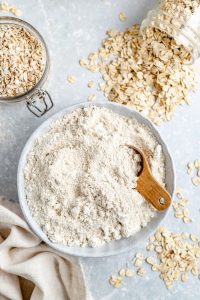
Oat Flour is not difficult to substitute; in fact, there are many options available on the market. That depends entirely on your preferences and the type of cuisine you are preparing. I recommend that you conduct your research to see which types of flour may successfully replace oat flour in baked products such as bread, cakes, cookies, and other baked goods.
Please make a list of all the outcomes and see which one works best, then save it for the next time you make that meal. Being creative and flexible in the kitchen, whether you’re a home cook or a seasoned chef, is the key to making the most of the tools available to you. Put another way, don’t be afraid to think beyond the box.











